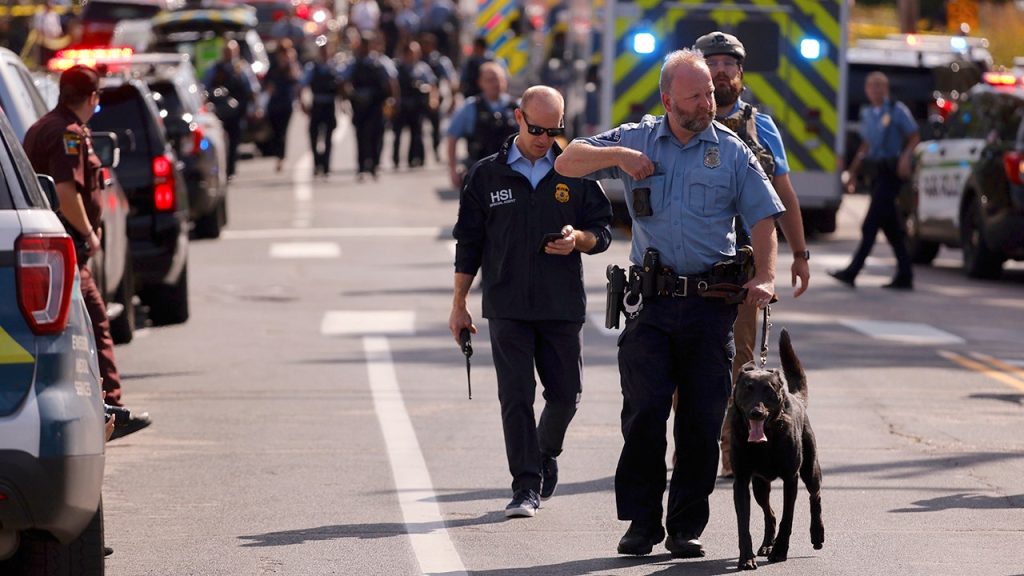Tragedy in Minneapolis: A Community’s Response to Senseless Violence
In the wake of a devastating shooting at Annunciation Catholic School in Minneapolis, communities across the nation are grappling with shock and heartbreak. The tragedy, which claimed the lives of two children and left 17 others injured during a Wednesday morning mass, has sparked conversations about violence, responsibility, and healing. Among those thrust unexpectedly into the narrative is Brandon Herrera, a Second Amendment activist, YouTuber, and Texas Republican congressional candidate, who found himself referenced in disturbing content allegedly created by the shooter.
Upon learning that the suspect had mentioned him in a video, Herrera expressed profound distress, stating he was “horrified by this clearly hate-motivated attack on innocent children” and “disgusted” that the shooter had invoked his name. Though the suspect claimed to have met Herrera at SHOT Show (Shooting, Hunting, and Outdoor Trade Show) in Las Vegas and had a conversation where “they agreed on a lot of things,” Herrera emphasized that neither he nor anyone accompanying him recalled such an encounter. This disconnect highlights the sometimes unpredictable ways in which public figures can be drawn into tragedy without any direct involvement. The NSSF, which operates SHOT Show, later confirmed through verification of attendee records that the shooter’s name did not appear on any registration lists for the 2024 event or any previous years, contradicting the shooter’s claims and underscoring that the trade show is not open to the general public.
The suspect in the shooting, identified by authorities as going by the names Robin Westman and Robert Westman, allegedly took his own life at the scene after the attack. A disturbing video posted under the name Robin Westman—later removed from YouTube—contained images of handwritten notebook pages, bullets, weapons with painted messages, and commentary. While authorities have not officially confirmed the authenticity of this content, its existence raises troubling questions about the shooter’s mindset and planning. The mention of Herrera in this material has prompted the congressional candidate to make himself “fully available to the FBI and any other law enforcement agency” with questions regarding the case, demonstrating a commitment to transparency during the investigation.
In response to being involuntarily connected to such a horrific event, Herrera has taken a firm stance against the violence. On social media, where he maintains a presence under the handle “TheAKGuy,” he refused to name the perpetrator, instead directing his message to the families affected by the tragedy. “My heart goes out to the family of those affected,” he wrote, while condemning the shooter in no uncertain terms. This approach reflects a growing sentiment among many public figures and media outlets to deny notoriety to mass shooters, focusing instead on the victims and survivors. Beyond expressions of sympathy, Herrera mentioned that he is “coordinating with friends in law enforcement” to determine how he and his community might best support the families affected by the shooting, suggesting a desire to contribute positively to healing efforts.
The incident at Annunciation Catholic School represents yet another painful chapter in America’s ongoing struggle with mass shootings. The targeting of a religious institution during a service—a time when community members gather in vulnerability and faith—adds another dimension of horror to an already unthinkable act. The impact of such violence extends far beyond the immediate victims and their families, affecting the broader community’s sense of safety and trust. In Minneapolis, the shooting occurred close enough to the Democratic National Committee’s summer meeting that the gathering was temporarily adjourned, a sobering reminder of how violence disrupts not only individual lives but also civic functions.
As communities process this tragedy, various witnesses have come forward to share their experiences. One witness recalled hearing “sporadic” gunfire during the shooting, a detail that paints a terrifying picture of the chaos and fear that must have permeated the school that morning. Such firsthand accounts, while difficult to hear, provide important context for understanding the full human impact of mass shootings. They remind us that behind every headline about such events are real people whose lives have been irrevocably altered. In the aftermath of violence, these stories help foster empathy and potentially motivate meaningful action to prevent future tragedies. As law enforcement continues its investigation and the community begins the long process of healing, the focus remains on supporting those most directly affected while seeking to understand how such “hateful and senseless” acts can be prevented in the future.


